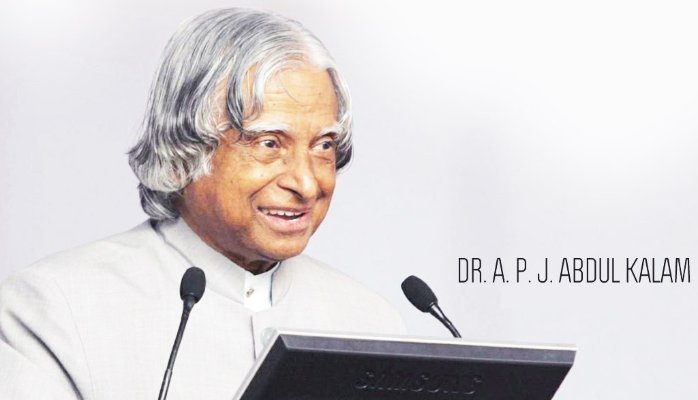
Avul Pakir Jainulabdeen "A. P. J." Abdul Kalam (15 October 1931 ` 27 July 2015) was the 11th President of India from 2002 to 2007. A career scientist turned reluctant politician, Kalam was born and raised in Rameswaram, Tamil Nadu, and studied physics and aerospace engineering. He spent the next four decades as a scientist and science administrator, mainly at the Defence Research and Development Organisation (DRDO) and Indian Space Research Organisation (ISRO) and was intimately involved in India's civilian space program and military missile development efforts. He thus came to be known as the Missile Man of India for his work on the development of ballistic missile and launch vehicle technology. He also played a pivotal organizational, technical, and political role in India's Pokhran-II nuclear tests in 1998, the first since the original nuclear test by India in 1974.
Kalam was elected President of India in 2002 with the support of both the ruling Bharatiya Janata Party and the opposition Indian National Congress. After serving a term of five years, he returned to his civilian life of education, writing and public service. He was a recipient of several prestigious awards, including the Bharat Ratna, India's highest civilian honour.
His father Jainulabudeen was a boat owner and imam of a local mosque; his mother Ashiamma was a housewife. His father owned a ferry that took Hindu pilgrims back and forth between Rameswaram. Kalam was the youngest of four brothers and one sister in his family. Kalam's ancestors had been wealthy traders and landowners, with numerous properties and large tracts of land. Their businesses failed and the family fortune and properties were lost over time. By his early childhood, Kalam's family had become poor; at an early age, he sold newspapers to supplement his family's income.
In his school years, Kalam had average grades but was described as a bright and hardworking student who had a strong desire to learn. After completing his education Kalam went on to attend Saint Joseph's College, Tiruchirappalli, from where he graduated in physics in 1954. He moved to Madras in 1955 to study aerospace engineering in Madras Institute of Technology. He narrowly missed achieving his dream of becoming a fighter pilot, as he placed ninth in qualifiers, and only eight positions were available in the IAF.
He learnt leadership from three great teachers`Dr. Vikram Sarabhai, Prof Satish Dhawan and Dr. Brahm Prakash. After graduating from the Madras Institute of Technology in 1960, Kalam joined the Aeronautical Development Establishment of DRDO as a scientist. He started his career by designing a small helicopter for the Indian Army. Kalam was also part of the INCOSPAR committee working under Vikram Sarabhai, the renowned space scientist. In 1969, Kalam was transferred to ISRO where he was the project director of India's first Satellite Launch Vehicle (SLV-III) which successfully deployed the Rohini satellite in near-earth orbit in July 1980; Kalam had first started work on an expandable rocket project independently at DRDO in 1965.
In the 1970s, Kalam also directed two projects, Project Devil and Project Valiant, which sought to develop ballistic missiles from the technology of the successful SLV programme.Despite the disapproval of the Union Cabinet, Prime Minister Indira Gandhi allotted secret funds for these aerospace projects through her discretionary powers under Kalam's directorship. Kalam played an integral role convincing the Union Cabinet to conceal the true nature of these classified aerospace projects. His research and educational leadership brought him great laurels and prestige in the 1980s. Kalam played a major part in developing many missiles under the mission including Agni, an intermediate range ballistic missile and Prithvi, the tactical surface-to-surface missile.
Kalam served as the Chief Scientific Adviser to the Prime Minister and the Secretary of the Defence Research and Development Organisation from July 1992 to December 1999. The Pokhran-II nuclear tests were conducted during this period in which he played an intensive political and technological role.
Kalam served as the 11th President of India. His term lasted from 25 July 2002 to 25 July 2007. During his term as president, he was affectionately known as the People's President.
After leaving office, Kalam became a visiting professor at the Indian Institute of Management Shillong, the Indian Institute of Management Ahmedabad, and the Indian Institute of Management Indore; an honorary fellow of Indian Institute of Science, Bangalore; chancellor of the Indian Institute of Space Science and Technology Thiruvananthapuram; professor of Aerospace Engineering at Anna University; and an adjunct at many other academic and research institutions across India. He taught information technology at the International Institute of Information Technology, Hyderabad, and technology at Banaras Hindu University and Anna University.
Please click on the Link below to view an interesting and inspiring interview of APJ Abdul Kalam.

